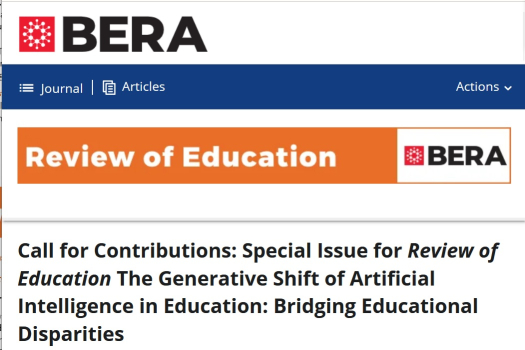
Call for Contributions: Special Issue for Review of Education
The Generative Shift of Artificial Intelligence in Education: Bridging Educational Disparities
Fin participación: 2 de octubre 2025
© British Educational Research Association.
Guest editors Dr. Daria Mizza (American University in Cairo), Dr. Mohammed Saqr (University of East Finland), Mrs. Karen Zecca (Cardiff Metropolitan University), and Mx. Kayden J Schumacher (Coventry University) invite high-quality submissions for a forthcoming special issue focusing on the transformative potential of Generative Artificial Intelligence (GAI) in education.
The rapid advancements in GAI are transforming the educational landscape, demonstrating remarkable capabilities. By analyzing vast datasets, GAI can generate individualized learning pathways, serving as a virtual tutor to identify knowledge gaps and deliver tailored instruction. This approach holds promise for students facing challenges due to factors such as disability, gender, race, ethnicity, and socioeconomic status. However, realizing GAI's full potential requires careful consideration of its integration into educational contexts.
This special issue, therefore, explores the transformative potential of GAI in education. Authors examine how GAI can contribute to creating personalized learning experiences tailored to individual student needs. Through the generation of individualized educational materials, GAI can help educators unlock the full potential of every student, including those students who often face unique challenges due to intersecting factors such as gender, race, ethnicity, and socioeconomic status. These identities can influence access to resources, limiting opportunities for inclusion. Similarly, students with disabilities, whose experiences are often shaped by intersecting factors of physical, cognitive, and socioeconomic conditions, require the development of tailored educational approaches to ensure equitable outcomes. GAI can play a pivotal role in this process by analyzing vast amounts of data to identify patterns and tailor individualized learning plans.
We invite contributions that examine how GAI can effectively address educational disparities.
To this end, contributions may explore, but are not limited to, the following topics:
- GAI for automatic generation of learning materials (lesson plans, exercises and activities, quizzes and tests)
- GAI for designing assessments of student learning (formative and summative feedback, scaffolding tasks for improvement)
- GAI for teacher support in their roles to create engaging learning experiences
- GAI for teacher professional development
- GAI for fostering student self-directed learning, critical thinking, and metacognition in diverse populations
- GAI for the unique needs of postgraduate students and English as a Second Language (ESL) Learners: Opportunities and challenges
- GAI for enhancing learning outcomes in non-STEM disciplines
- Ethical and effective integration of GAI into primary school education for young learners
- GAI as an asset in the early detection and understanding of learning challenges like dyslexia, ADHD, and autism spectrum disorders (ASD).
- GAI to enhance inclusive education for students with disabilities from diverse cultural backgrounds
- Ethical considerations of GAI in education, including privacy, bias, fairness, and student agency
- Policy and practice for inclusive GAI
Please note: We discourage proposals for one-shot workshops or short-term experiments, as these fail to capture the complexities of GAI integration in education.
Notification of accepted abstracts will be communicated in January 2026. Full papers will be submitted for peer review by September 2026, with final versions agreed by January 2027, and publication anticipated in March 2027.




